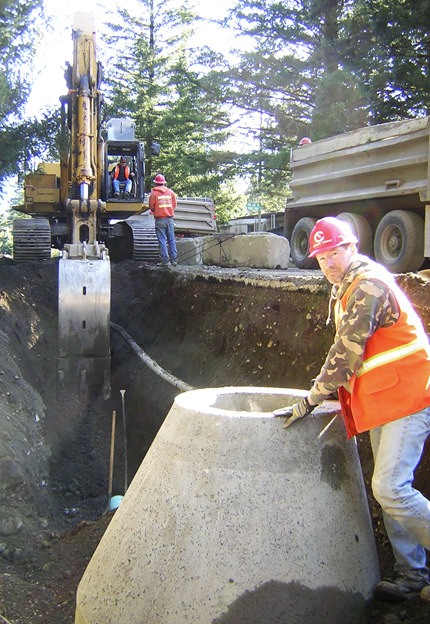As heavy machinery and hard-hatted construction workers dug their way down a Wood River side street, North Bend Public Works Director Ron Garrow explained how the pipes they are laying will change the city.
The $16 million Tanner sewer project lays the groundwork for new homes and businesses on the city’s east side, while replacing decades-old septic systems with a more sanitary, centralized system.
Property owners formed a utility local improvement district, or ULID, to pay for the sewer’s extension. About 70 percent of voters in the district supported the plan.
“We’re doing this because they asked for it,” Garrow said. “It was done by petition. We said, ‘Yes, we’ll extend it out there.’”
About three quarters of the ULID contains some sort of building or improvement, while the rest of the property is vacant.
Construction on the sewer project started last October; the project will wrap in January of 2011.
Sewers replace septic systems, which are not attractive or environmentally preferable for commercial development, said North Bend City Administrator Duncan Wilson.
As the city emerges from its 10-year growth moratorium, Wilson said expansion — in residents, tourism, commerce and industry — is needed to stabilize city revenues.
“We want it to be a controlled growth,” he said. “We walk a tight rope providing for development and sewer… while at the same time having to mix in what everybody wants, which is quality of life in North Bend.”
Garrow said the inspector and contractors are receiving a growing number of requests from residents who want to hook-up to the system right away.
“There’s a lot of smells there due to failed systems,” Garrow said. “They’re looking forward to it being in service.”
Sewers benefit the environment by avoiding contamination to groundwater.
Big boxes?
Mayor Ken Hearing said the new sewer system will benefit both property development and residents.
“This will allow properties to be developed at a higher and better use, providing better jobs,” he said. “As far as people’s lives, it will have a lower impact to our ecosystem — particularly our water.”
With more opportunities to build, concerns also grow on what kind of businesses will come into the neighborhood.
Hearing has fielded questions from residents on whether a big box retail store, such as a Target or Walmart, will come to town, siting at Tanner.
The new sewer system will have the capability to accommodate a large store. However, the city’s zoning code does not allow retail stores — excepting grocery stores — above 20,000 square feet. Big box stores typically start at around 50,000 square feet.
As of Tuesday, no new development applications had been received by the city.
ULID dues
Garrow said the bid process for the sewer project, won by Northwest Cascade, Inc., was competitive and drove down prices for ULID members.
Member dues are based on a special benefit study, in which an appraiser determines how much their property values rise due to sewers. The sum of all the added values in the district is then proportioned out to members, based on that value. A typical single-family homeowner would pay less than $4,000 for a value increase of as much as $10,000, according to the city.
“For the most part, the value to these properties will be significantly higher than what they have to pay over time,” Wilson said.
Property owners have up to 20 years to pay, but interest will be added.
For more information or updates on the construction of the sewer installation, visit www.ci.north-bend.wa.us.



